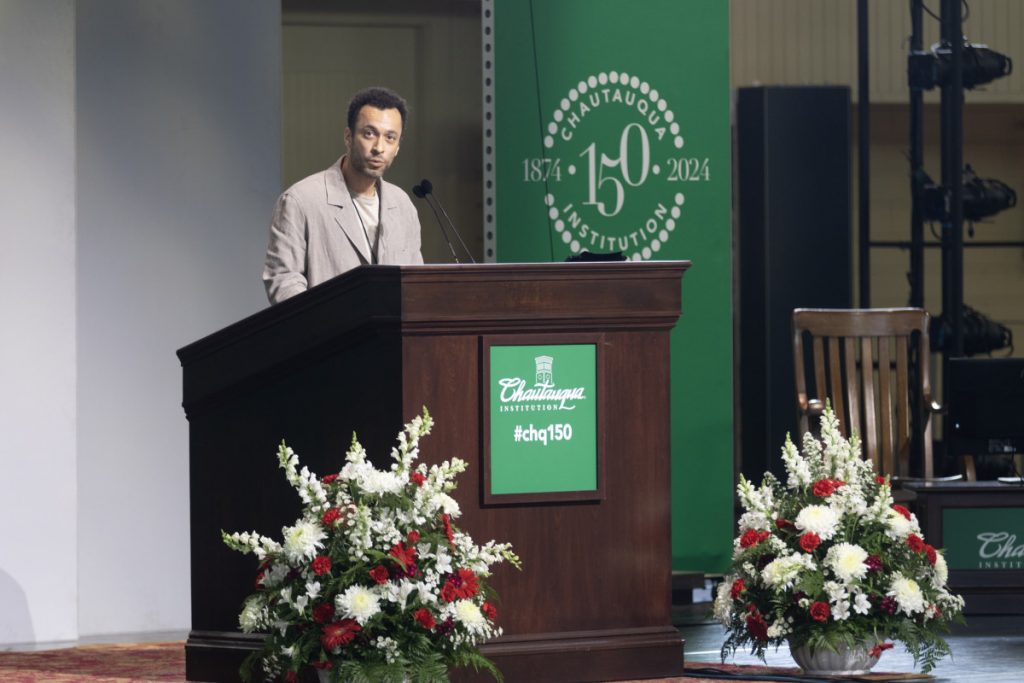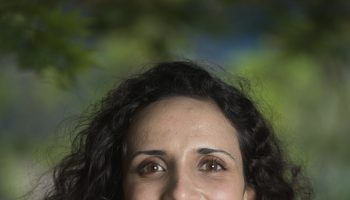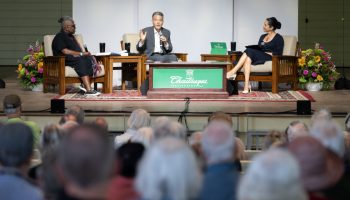
Thomas Chatterton Williams, staff writer at The Atlantic and visiting professor of humanities and senior fellow at the Hannah Arendt Center at Bard College, gives his lecture Monday in the Amphitheater.
Thomas Chatterton Williams took the stage Monday morning in the Amphitheater to open this week’s Chautauqua Lecture Series “Our Greatest Challenges (That We Can Actually Do Something About).”
Williams, a cultural critic and staff writer for The Atlantic currently based in Paris, is the author of memoirs Self-Portrait in Black and White and Losing My Cool. He is currently a visiting professor of humanities and a senior fellow at the Hannah Arendt Center at Bard College. He is also a visiting fellow at the American Enterprise Institute, a Washington D.C.-based think tank, and a 2022 Guggenheim fellow.
As he was drafting a section of his forthcoming book Nothing Was the Same that dealt with the Jan. 6, 2021, attack on the U.S. Capitol, Chatterton Williams realized how hard it was becoming to think lucidly about the present moment and the recent American past.
“It’s getting harder and harder to remember all the little ways our political life used to be much different, much saner, more human in scale prior to the extreme fragmentation and acceleration of reality through technology and spectacle,” he said.
That can be attributed in part to the pervasiveness of social media and the ubiquity of smartphones, he said, so “one of the most urgent tasks before us now is to record and reflect critically on the excesses of the not-so-distant past and enormous normative shifts and challenges that the recent past has produced for us, so that we might finally achieve our American democracy in a just and lasting way,” he said. “We must somehow find the strength and stamina to refuse the pressure everywhere around us to balkanize our lives and instead to engage each other as fellow citizens worthy of compromise — not as opponents who need to be vanquished.”
In order to endure difficult and emotional conversations about the social structures of prejudice, inequality, racism, and racial identity — as a way of addressing human diversity, poverty, policing, patriotism — we must step beyond ideological bubbles.
“A significant part of what makes our cultural, political and social debates so extraordinarily vehement today, so bad-faith and, frankly, so unbearable is the increasingly nonphysical nature (of our discourse),” he said. “Although we are being exposed to each other’s perspectives more than ever before and there’s more speech than has ever been recorded and distributed in the history of humanity, we are not all sitting in the same room together actively listening, or even pretending to be listening, anymore.”
While the internet and social media form a big part of the conversation, they have completely changed the ways in which we work individually and collectively, affecting the nature of how we engage in debates.
Chatterton Williams discussed the first summer of the COVID-19 pandemic, with ongoing protests against racial injustice and the fierce debate around “cancel culture” — the penalty for “transgression has mostly decreased from bodily harm to reputational destruction.” He pointed to New York Times editor James Bennet, who was forced to resign for publishing an Op-Ed from U.S. Sen. Tom Cotton, in which the senator wrote on the “hotly debated topic of how to establish order in American cities in the throes of sometimes extremely violent riots in the wake of George Floyd’s murder.”
“Reasonable people can disagree on the wisest path forward in times of chaos, but the possibility of debate and good-faith disagreement had degraded at that moment to such an extent that Bennett’s own junior colleagues took to social media to make the extraordinary claim that the very act of even hearing a point of view they disagreed with literally put Black people’s lives in danger,” said Chatterton Williams.
Constantly feeding “competing moral and political visions” into what can be considered an Online Pressure Cooker collectively creates a segmented environment — that is not conducive to transcending division — which has been highlighted by the atmosphere surrounding American politics in the past week.
“We are daily creating and re-creating a public space that actively encourages in so many little ways and not-so-little ways the deepening of all our pre-existing fault lines,” he said. “Is it any wonder that we have arrived now at this stage of not just symbolic but genuine political violence?”
In 2020, Chatterton Williams drafted and organized a letter on justice and open debate that was signed by more than 150 writers, artists and intellectuals of all sides of the political spectrum, published in Harper’s Magazine.
“The letter, as it became known, made an extremely simple point that forever bears repeating,” he said. “Justice and freedom are inextricable values that, in a democracy, one cannot exist in the absence of the other.”
Chatterton Williams said that the letter, however divisive, helped bring to light an intolerance of opposing views and the societal and governmental tendency to dissolve complex issues into a binding moral certainty that had a restrictive effect on public debate.
“The way to defeat bad ideas is by exposure, argument and persuasion, not by trying to silence or wish them away,” he said.
The letter was framed as anti-Black and white supremacist because of the timing of its release, and the Black and other non-white signatures — like Chatterton Williams’ — were dismissed as ironic.
“A surprising number of critics argued the current silencing of new voices today is not a significant problem — as if inequality that is achieved by rendering everyone as insecure as oppressed minorities once were, is a desirable and effective vision for the future,” he said.
In order to achieve change, society can begin to engage in difficult debates by listening to and building on each other’s views. People should be applying the same scrutiny and skepticism to their own ideas as they do to others’ in order to identify their own biases, Chatterton Williams said. Only then can a conversation extend beyond superficiality.
“Important conversations require freedom of expression and even freedom to make mistakes,” he said. “We all should want justice, which unequivocally requires inclusiveness, but there’s no space that can be truly just or inclusive in which freedom is purposefully or even informally restricted. Openness is not a luxury or nicety. It’s a necessity of a liberal society.”
As political polarization grows, Chatterton Williams said he believes the way to persuade one another on “hard-earned and particular truths is to search for ways to deemphasize the categories attached to us” — categories that seem to divide us — which requires tolerance and humility.
For Chatterton Williams, the idea of America’s system of “racial categorization” fell apart when encountering texts from Barbara Fields, Adrian Piper, Ralph Ellison and Henry Louis Gates Jr., who “challenged and rejected the consensus position on racial difference that I had never previously understood could be questioned.”
“The fiction of race which has divided us so profoundly and continues to divide us … is a lie that depends entirely on our collective volitional reality,” he said. “Ceasing to repeat this lie and, more importantly, refusing to believe it in the first place constitutes another of our greatest challenges.”
Chatterton Williams’ father has only ever been described as Black, he said, and due to the societal identity he assumed, he believed that his family’s identity would forever be made in his father’s image — despite Chatterton Williams’ mother being white. After finding out from 23andMe that 59.2% of his genetic makeup was European, he began to reflect on the contradictions that could imply about the categories society embeds on people.
“Growing up, I understood myself to be Black; and yet I was also exposed to whiteness through a mother and most, though certainly not all, members of her family in non-antagonistic, positively nurturing ways,” he said. “My children, who are roughly one-fifth of West African descent, are so fair-haired and blonde that they can blend in with locals when we travel in Sweden.”
This has allowed Chatterton Williams to look at both the past and unwritten future of his family story, and the multigenerational transformation it has gone through.
“People will always look different from one another in ways we can’t control,” he said. “What we can control is what we make of those differences, and how we endeavor to build bridges of understanding and communion between them.”
As long as society imposes racial categories and separates facets of humanity’s shared realities, Chatterton Williams believes engaging in meaningful conversations will be much, much harder to do.
“We must revisit, reassess and ultimately learn to reaffirm our core national beliefs and values, which have been so gravely tested in recent years, but which always formed the basis of any enduring social progress,” he said.
In closing, Chatterton Williams argued that Americans must trust in the process of “authentic liberalism again if we are ever going to make our multiethnic societies hospitable to ourselves and to the future generations that we hope will surpass us.” If the American mind has been closed, it must be reopened — which brought him back to the question of challenges that we can actually do something about.
The fundamental political unit, he said, going back to Aristotle, is the family — the foundation for the health of a community.
“At this moment when our focus has so far powerfully shifted to the macro-level — to the institutions, parties, systems and invisible structures — fathers and mothers, aunts and uncles, big sisters and older brothers are going to have to inculcate the values, practices and habits of thought that prepare their children to make the exertions necessary to heal our riven society,” Chatterton Williams said. “All of us, together, do control this at the micro-level. These are a few of the small yet crucial things, the slight yet profound shifts in attitude that we can all do right now that inevitably accumulate to make a powerful and lasting difference.”




